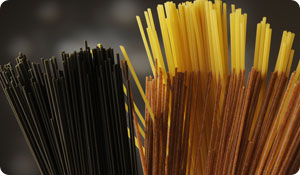
Italian, Chinese, German, Japanese-almost every cuisine has its own signature style of pasta or noodle, usually made with refined wheat or rice flour, and formed into traditional shapes. But pasta is also made from several lesser-known, alternative grains and vegetable fibers.
Before there was "pasta," there was simply spaghetti and macaroni, and before more sophisticated Asian noodle dishes went mainstream, there was packaged instant ramen. The options were few; pretty much every type of pasta or noodle was made with high-gluten durham wheat, or semolina flour. But things have changed. If you can't eat wheat, or you're just plain bored with your usual pasta dishes, try one of these tasty alternatives, available in most health food stores, ethnic markets and well-stocked supermarkets.
Jerusalem Artichoke Pasta
Jerusalem artichoke is not an artichoke and it is not from Jerusalem. In fact, it is the tuber of a type of sunflower grown in the United States. Ground and dried Jerusalem artichokes are processed into a powder that is used as a nutritional supplement and as a flour in pasta and baked goods.
Jerusalem artichoke flour contains no fat or starch, but is high in the carbohydrate inulin. Inulin is a prebiotic fiber that encourages the growth of "good" bacteria in the gut known as bifidobacteria. Bifidobacteria promotes healthy digestion. Inulin may also help the body absorb calcium and help people with diabetes control their blood sugar levels.
Spelt Pasta
Spelt is an ancient variety of wheat that reportedly can be dated back as far as 10,000 B.C. As a food crop, spelt is grown primarily for feeding livestock, but it is also milled into a high-protein, high-fiber flour that is used to make pasta and other foods. Although spelt is in the wheat family of grains, it can be eaten by some people who are allergic to wheat. Since spelt contains the wheat protein gluten, however, people with celiac disease or who are allergic or sensivite to gluten, cannot eat spelt pasta or other spelt products.
Farro Pasta
Emmer wheat, another variety of wheat recorded in ancient history, is popular in Italy, where it is called farro. Like spelt, emmer is a strong grain that is difficult to hull. That's why faro pasta is a specialty item and not as readily available as the more common pastas made with durum and semolina wheat. But also like spelt, the resulting flour is high in protein and fiber, and may be tolerated by people with wheat allergies. (If you have wheat or other grain allergies, however, you should consult with your physician before trying any type of wheat or alternative grain. Farro cannot be tolerated by people with celiac disease.)
Buckwheat Noodles
Buckwheat is not a variety of wheat, but a completely separate type of grain that is particularly high in good-quality protein. In the United States, buckwheat has historically been used mostly as food for livestock, but in recent years it has become more popular as a cereal grain and ground into flour to make Japanese-style buckwheat noodles, known as soba noodles.
Soba Noodles
Soba noodles are made from either 100% buckwheat flour or a combination of buckwheat flour and wheat flour. They are a good alternative to regular pasta when you're looking for a change of pace, but the blended varieties are not suitable for anyone with a wheat or gluten allergy. Some brands of soba noodles also contain eggs. If you have allergies, it is important to read the package labels to avoid soba noodles made with regular wheat flour.
Study References:
Lamb, D.H. "Spelt, Long-Popular Grain." The University of Vermont Extension. 02 February. 2010. Web. 08 June 2010.
Martin, Hugh. "What is Spelt?" Ontario Ministry of Agriculture. 05 September 2003. Web. 08 June 2010.
NutraTec. "Jerusalem Artichoke Flour" Web. 08 June 2010.
Oplinger, E.S., dOelke, E.A. Brinkman, M.A. and Kelling, K.A. "Buckwheat." Alternative Field Crops Manual. University of Wisconsin-Extension/University of Minnesota. 10 January 2000. Web. 08 June 2010.
University of Kentucky College of Agriculture. "Spelt." December 2008. Web. 08 June 2010.





